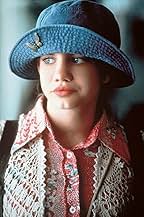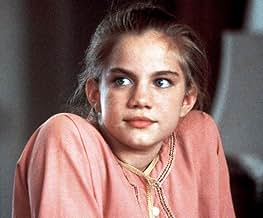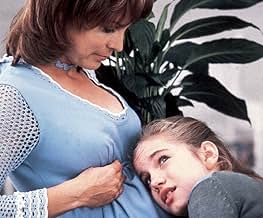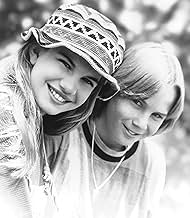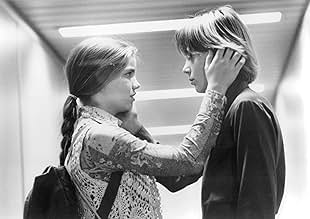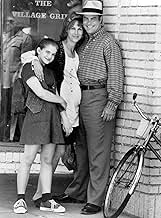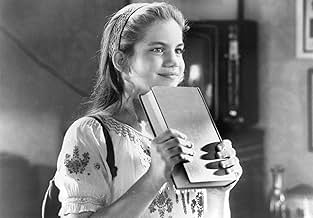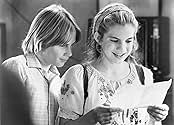Vada Sultenfuss must go to LA to stay with her Uncle Phil to do some research on her mother's life, but finds much more.Vada Sultenfuss must go to LA to stay with her Uncle Phil to do some research on her mother's life, but finds much more.Vada Sultenfuss must go to LA to stay with her Uncle Phil to do some research on her mother's life, but finds much more.
- Awards
- 1 win & 2 nominations total
JD Souther
- Jeffrey Pommeroy
- (as John David Souther)
- Director
- Writers
- All cast & crew
- Production, box office & more at IMDbPro
Storyline
Did you know
- TriviaThe cabin Jeffrey lives in was also used in the movies Eraser (1996) and Friday the 13th: The Final Chapter (1984).
- GoofsAt the beginning of the film, Vada's English teacher asks his class to write a paper about someone that they don't know. When questioning the class, one of Vada's classmates says that he wants to write about Farrah Fawcett, due to the fact that he likes to watch her run on television, an obvious reference to her role on Charlie's Angels (1976). However, the film takes place in 1974, two years before Charlie's Angels premiered. In addition, Fawcett, although working as an actress, was mostly an unknown at the time.
- Quotes
Vada Sultenfuss: Why is it boys talk so much, when they have nothing to say? And girls have plenty to say, but no one will listen?
- Alternate versionsThe booklet contained in the "My Girl 2" soundtrack features photos of two scenes not in the theatrical cut. The first is a scene in which Vada and Nick eat hot dogs at a park. The other is a scene in which we actually get to see Vada get her ear pierced instead of just hearing about it.
- ConnectionsFeatured in Siskel & Ebert: The Getaway/Blank Check/My Girl 2 (1994)
- SoundtracksOur House
Written by Graham Nash
Performed by Crosby Stills Nash & Young (as Crosby, Stills, Nash & Young)
Courtesy of Atlantic Recording Corp.
By Arrangement with Warner Special Products
Featured review
My Girl was a huge worldwide success, bringing us a plot that handled delicately and carefully serious and deep themes such as the relationship between life and death, losses, mourning, among other important themes, told under the eyes of Vada, a girl of 11 years in Pennsylvania. It was a film that certainly amused and caused a stir in the audience due to the unfolding of the plot.
Three years have passed since the events of the first film. There is an upcoming holiday and Vada Sultenfuss (Anna Chlumsky) convinces his father, who allows him to travel to his uncle Phil's (Richard Masur) home in Los Angeles. Vada's drama teacher gives her the task of interpreting the life of someone she has never met, so she wants to research her own mother's life. On this voyage of discovery, she has as partner Nick Zsigmond (Austin O'Brien), the son of Rose Zsigmond (Christine Ebersole), his uncle's girlfriend.
Written by Janet Kovalcik, this sequence brings an important change of tone, leaving it appealingly sentimental. The first film forced Vada to face some shocking realities (the death of a best friend, the senility of a grandmother) and was heavily salted with mortal humor, while in this sequence the atmosphere of the sequence is softer and more golden. Among other things, the film is a nostalgic Valentine's Day for Los Angeles in the most remote days, when the city still used the mystique of a relaxed post-hippie lotus land.
This second part ends up running away from the thorniest issues previously discussed. Obviously, due to the protagonist's entry into adolescence, the film starts to deal with other themes, tries to advance the plot and at the same time fails to let go. Right at the beginning of the plot, we see that Vada remains the best friend of Judy (Lauren Ashley), who in turn, starts to become interested in one of her schoolmates. Already Vada, she still does not know how to deal with this adolescent phase and does not know how to identify the signs and these new feelings. It is a phase of discoveries presenting itself to her, her best friend, typical of the age they are in, when feelings are transformed and interests are changed. At the same time, Vada is also about to become the older sister, as Shelley (Jamie Lee Curtis) is pregnant with her father (Dan Aykroyd). When Harry asks his daughter to switch rooms when the baby arrives, Vada and the audience have another sign that the girl has grown up and that she had to adapt to the new reality.
Just as life goes on and things change, Vada also feels the need to have answers about her mother when her teacher asks her students to write about someone they have never met. This causes more changes to occur in the girl's life when she needs to go to Los Angeles, where her mother was born and lived a large part of her life. Arriving in the city, where her uncle Phil (Richard Masur) also lives, she also meets Nick, the son of his uncle's girlfriend, with whom she starts to live intensely for the following days in search of answers about her mother's past. The script then divides into these two stories. One is Vada's present in Pennsylvania, while the search for the past unfolds in Los Angeles, where the plot actually unfolds. And this is perhaps the big problem with the film, which is very much tied to the past and little developed.
Starting with the clues about the past of Vada's mother, Maggie (Angeline Ball). The ease with which the tracks appear, which are forced to connect only in order to make the script go, is remarkable. Since the focus of the plot was on searching for Maggie's past, there was a lack of more outstanding characters who could, in fact, unravel and show the public more effectively the relationship they had with Maggie, how she influenced their lives positively or negative, bringing more complexity and significant discoveries, that would make the public really care more about their past, so that we could, in fact, surprise and meet Maggie together with Vada and share with her the surprises, anxieties and joys to measure that this "investigation" was evolving.
Furthermore, small discoveries are significantly less important, such as having been suspended from a class, for example. The ultimate goal was that, to show an ordinary woman, with her dreams and talents, who cannot complete them. Maggie wanted to experience everything in life, including being a mother, but unfortunately her dreams and plans were interrupted. However, the feeling that the public remains, is that it was necessary to bring more layers to the character and more relevant facts about her life. With the exception of Jeffrey Pommeroy (John David Souther), who provides us with these significant and exciting moments, we do not feel the same with the other characters that appear throughout the projection.
The "dubious scenario" of the film is made even more by the approach of director Howard Zieff and screenwriter Janet Kovalcik. Everything in this film is full of sermons about the importance of being yourself. Vada does not feel any twinge of anger at the loss of her mother or any doubt about her search. She is prematurely mature. There are indeed connections to the previous film across the Pennsylvania core, and even Thomas J. is quoted and remembered in a passage in Los Angeles, but otherwise, this sequence could easily pass as a single film. This investigation in LA is far from intrinsic complexity, difficult to deal with, striking emotional moments or the poetry of the previous plot. Another aspect that harms is the relationship between Vada and Nick. After less than a week, teenagers develop a fast and shallow relationship, and it doesn't even come close to the relationship that Vada had with Thomas J., the sincere friendship of a whole childhood. Not that the actors are in bad shape, but the script is extremely hurried to develop the plot in California and features several forgettable characters. The feeling that remains is that both the sets and the plot could have been developed much more effectively.
Much of the original cast is back, but that's another problem. In addition to the hurried relationship between the teenage protagonists, Dan Aykroyd and Jamie Lee Curtis are only supporting actors, far from the main story and only serve to situate the viewer in the plot. They do not have the same importance in the relationship with Vada that they had in the previous film. It is really a waste of talent and the proof that perhaps taking the plot to another city and exploring the past was a wrong choice, neglected in relation to actually advancing the plot and character development. Already the most incisive presence of Uncle Phil (Richard Masur), now with his girlfriend Rose (Christine Ebersole) brings some good moments of comedy when talking about how Phil does not expose his feelings when making a more serious commitment to Rose. In spite of having good moments, they seem to be out of place, which only serve to produce a conversation between Vada and Nick, when they wonder if they would be related from that moment on with the romance between Phil and Rose.
It is rather a less inspired film and one that lacks the courage and complexity of its previous copy, but that, in a way, still presents us with a few discoveries about Vada's past, leaves us a little apprehensive with one of these revelations that put in check the girl's true paternity, and which shows how the girl's life is after a few years, she overcame or learned to deal with the losses of the past. It is a film with the right heart, but it does not have the same innocence and magic as before. It is worth visiting, especially for the charisma and talent of Anna Chlumsky, who once again steals the show.
Three years have passed since the events of the first film. There is an upcoming holiday and Vada Sultenfuss (Anna Chlumsky) convinces his father, who allows him to travel to his uncle Phil's (Richard Masur) home in Los Angeles. Vada's drama teacher gives her the task of interpreting the life of someone she has never met, so she wants to research her own mother's life. On this voyage of discovery, she has as partner Nick Zsigmond (Austin O'Brien), the son of Rose Zsigmond (Christine Ebersole), his uncle's girlfriend.
Written by Janet Kovalcik, this sequence brings an important change of tone, leaving it appealingly sentimental. The first film forced Vada to face some shocking realities (the death of a best friend, the senility of a grandmother) and was heavily salted with mortal humor, while in this sequence the atmosphere of the sequence is softer and more golden. Among other things, the film is a nostalgic Valentine's Day for Los Angeles in the most remote days, when the city still used the mystique of a relaxed post-hippie lotus land.
This second part ends up running away from the thorniest issues previously discussed. Obviously, due to the protagonist's entry into adolescence, the film starts to deal with other themes, tries to advance the plot and at the same time fails to let go. Right at the beginning of the plot, we see that Vada remains the best friend of Judy (Lauren Ashley), who in turn, starts to become interested in one of her schoolmates. Already Vada, she still does not know how to deal with this adolescent phase and does not know how to identify the signs and these new feelings. It is a phase of discoveries presenting itself to her, her best friend, typical of the age they are in, when feelings are transformed and interests are changed. At the same time, Vada is also about to become the older sister, as Shelley (Jamie Lee Curtis) is pregnant with her father (Dan Aykroyd). When Harry asks his daughter to switch rooms when the baby arrives, Vada and the audience have another sign that the girl has grown up and that she had to adapt to the new reality.
Just as life goes on and things change, Vada also feels the need to have answers about her mother when her teacher asks her students to write about someone they have never met. This causes more changes to occur in the girl's life when she needs to go to Los Angeles, where her mother was born and lived a large part of her life. Arriving in the city, where her uncle Phil (Richard Masur) also lives, she also meets Nick, the son of his uncle's girlfriend, with whom she starts to live intensely for the following days in search of answers about her mother's past. The script then divides into these two stories. One is Vada's present in Pennsylvania, while the search for the past unfolds in Los Angeles, where the plot actually unfolds. And this is perhaps the big problem with the film, which is very much tied to the past and little developed.
Starting with the clues about the past of Vada's mother, Maggie (Angeline Ball). The ease with which the tracks appear, which are forced to connect only in order to make the script go, is remarkable. Since the focus of the plot was on searching for Maggie's past, there was a lack of more outstanding characters who could, in fact, unravel and show the public more effectively the relationship they had with Maggie, how she influenced their lives positively or negative, bringing more complexity and significant discoveries, that would make the public really care more about their past, so that we could, in fact, surprise and meet Maggie together with Vada and share with her the surprises, anxieties and joys to measure that this "investigation" was evolving.
Furthermore, small discoveries are significantly less important, such as having been suspended from a class, for example. The ultimate goal was that, to show an ordinary woman, with her dreams and talents, who cannot complete them. Maggie wanted to experience everything in life, including being a mother, but unfortunately her dreams and plans were interrupted. However, the feeling that the public remains, is that it was necessary to bring more layers to the character and more relevant facts about her life. With the exception of Jeffrey Pommeroy (John David Souther), who provides us with these significant and exciting moments, we do not feel the same with the other characters that appear throughout the projection.
The "dubious scenario" of the film is made even more by the approach of director Howard Zieff and screenwriter Janet Kovalcik. Everything in this film is full of sermons about the importance of being yourself. Vada does not feel any twinge of anger at the loss of her mother or any doubt about her search. She is prematurely mature. There are indeed connections to the previous film across the Pennsylvania core, and even Thomas J. is quoted and remembered in a passage in Los Angeles, but otherwise, this sequence could easily pass as a single film. This investigation in LA is far from intrinsic complexity, difficult to deal with, striking emotional moments or the poetry of the previous plot. Another aspect that harms is the relationship between Vada and Nick. After less than a week, teenagers develop a fast and shallow relationship, and it doesn't even come close to the relationship that Vada had with Thomas J., the sincere friendship of a whole childhood. Not that the actors are in bad shape, but the script is extremely hurried to develop the plot in California and features several forgettable characters. The feeling that remains is that both the sets and the plot could have been developed much more effectively.
Much of the original cast is back, but that's another problem. In addition to the hurried relationship between the teenage protagonists, Dan Aykroyd and Jamie Lee Curtis are only supporting actors, far from the main story and only serve to situate the viewer in the plot. They do not have the same importance in the relationship with Vada that they had in the previous film. It is really a waste of talent and the proof that perhaps taking the plot to another city and exploring the past was a wrong choice, neglected in relation to actually advancing the plot and character development. Already the most incisive presence of Uncle Phil (Richard Masur), now with his girlfriend Rose (Christine Ebersole) brings some good moments of comedy when talking about how Phil does not expose his feelings when making a more serious commitment to Rose. In spite of having good moments, they seem to be out of place, which only serve to produce a conversation between Vada and Nick, when they wonder if they would be related from that moment on with the romance between Phil and Rose.
It is rather a less inspired film and one that lacks the courage and complexity of its previous copy, but that, in a way, still presents us with a few discoveries about Vada's past, leaves us a little apprehensive with one of these revelations that put in check the girl's true paternity, and which shows how the girl's life is after a few years, she overcame or learned to deal with the losses of the past. It is a film with the right heart, but it does not have the same innocence and magic as before. It is worth visiting, especially for the charisma and talent of Anna Chlumsky, who once again steals the show.
- fernandoschiavi
- Feb 6, 2021
- Permalink
- How long is My Girl 2?Powered by Alexa
Details
- Release date
- Country of origin
- Language
- Also known as
- Kız Arkadaşım 2
- Filming locations
- Kelly Gulch - 1801 N. Topanga Canyon Boulevard, Topanga, California, USA(Jeffrey Pommeroy's cabin)
- Production companies
- See more company credits at IMDbPro
Box office
- Gross US & Canada
- $17,359,799
- Opening weekend US & Canada
- $5,012,295
- Feb 13, 1994
- Gross worldwide
- $17,359,799
- Runtime1 hour 39 minutes
- Color
- Sound mix
- Aspect ratio
- 1.85 : 1
Contribute to this page
Suggest an edit or add missing content




